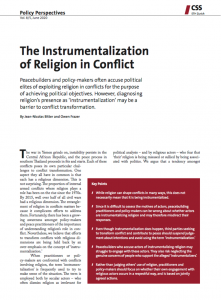The report was co-authored by Owen Frazer, Senior Program Officer in the Mediation Support Team at CSS, and Jean-Nicolas Bitter, Senior Advisor on Religion, Politics, and Conflict at the Swiss Federal Department for Foreign Affairs (FDFA). The Culture and Religion in Mediation project is a joint initiative between the CSS and the Swiss FDFA.
In this interview with Religion & Diplomacy editor Judd Birdsall, Frazer summarizes the key messages of the report and explores several issues related to the instrumentalization of religion.
Religion & Diplomacy: To begin, what does it typically mean to “instrumentalize religion”?

Owen Frazer. (photo credit: CSS)
Owen Frazer: In a political context, when people talk about someone “instrumentalizing religion” they typically mean that the person is using religion for their own political ends. Usually it is about mobilizing supporters in order to obtain political objectives or political power. This can be through general appeals to identity, or appeals to religious teachings, or a combination of the two. Sometimes these appeals are positive in tone (“support me and I will stand up for the interests of our identity group”, “support this policy because it is in line with what our holy book says”). More often politicians are accused of playing on fears of the religious “other” (“our way of life is under threat”, “their religion encourages the use of violence”), often to distract from other problems that they cannot, or may not want to address.
R&D: In the report you argue that the charge of instrumentalization is not simply a description. It’s often also a moral judgment.
Frazer: Yes. “Instrumentalization” generally has a negative connotation. The implication is that the person making appeals to religion is not being sincere. Their motivation is suspected of being different from the one they give. They are not as concerned by the interests of a particular religious identity group, or particular religious teachings, as their statements would suggest. They are considered to be opportunistically using people who are motivated by such appeals simply to get support. Their supporters, who are motivated by their religious appeals, are being used as a means to an end, which is commonly seen as morally wrong.
R&D: You suggest that much of our discussion around instrumentalization of religion for political ends rests on faulty assumptions about the separability of religion from politics. How can a more nuanced understanding of “religion”—and “politics”—help us better understand the interplay between the two?
Frazer: Delineating religion as a separate sphere from politics was a specific reaction to the wars of religion in Europe. This notion of religion as separate from politics, and particularly from the state, became very entrenched in Western, and particularly, European understandings. Through colonialism and historical forces, this notion of “religion” as something separate from other spheres of life was also “exported” to other parts of the word and adopted to greater and lesser extents. However, the relationship between religion and politics varies enormously across the world. Even in Europe the separation is not as clear as some might think. While it may be possible to distinguish between state and religious institutions, it is harder to separate religious norms, values and identities from politics. If people are voting along religious identity lines, as they continue to do in Northern Ireland for example, or voting according to their religious values, as many who oppose the legalization of abortion do, then we cannot say that religion is easily separable from politics. However, many people believe that religion is separate from politics and so when they see political actors making religious appeals they tend to assume that it is a case of instrumentalization because the real motivation must be “political”. In their minds the political cannot also be religious.
R&D: In my work I’ve noticed there is a strong partisan dimension to charges of instrumentalization of religion. For instance, if we like a particular politician and their policy goals we are likely not to be very bothered by their use of religious rhetoric or engagement with religious groups to pursue their agenda. But if we don’t like that politician or their policy agenda, we are likely to dismiss their use of religion as cynical, manipulative, and pandering to their base. It’s almost as if “instrumentalization” really means the use of religion by people we don’t like for goals we don’t like. What are your thoughts?
Frazer: I think there is a lot of truth in that. I just wrote a blogpost about the reaction to President Trump’s holding a Bible in a recent photo-op in front of St John’s Church while the Black Lives Matter protests were going on. A lot of the reactions to that incident split along partisan lines. Many Democrat voices were critical of Trump’s use of religious symbols, while Republicans backed it. However, I think it is important to note that there were also voices from the Republican side, from the Evangelical community, and from amongst religious leaders who condemned Trump’s use of religious symbols. I do not think all of those people were motivated by partisan considerations. However, that did not stop Trump suggesting that they were.
So, yes, I think there is a tendency to see references to religion through a partisan lens. However, I think there also are people who call out instrumentalization of religion by politicians they would otherwise support. This often requires courage, given the risk of being accused of betraying one’s own.
R&D: Your report highlights several risks associated with making a diagnosis of instrumentalization of religion? What are those risks?
 Frazer: Two of them relate to my answer to your last question. First, in accusing someone of instrumentalizing religion we risk being seen as politically partisan, just as Trump dismissed those who criticized his use of religious symbols. This is particularly a risk for those seeking to play a bridge-building role in conflict, where being perceived as impartial is an essential attribute.
Frazer: Two of them relate to my answer to your last question. First, in accusing someone of instrumentalizing religion we risk being seen as politically partisan, just as Trump dismissed those who criticized his use of religious symbols. This is particularly a risk for those seeking to play a bridge-building role in conflict, where being perceived as impartial is an essential attribute.
Secondly, in focusing too much on whether a politician is instrumentalizing religion, we may miss the bigger point. Regardless of whether a politician is sincere or not in their references to religions, they make them because they resonate with their base. That means those concerns and interests encapsulated by the politician’s religious references are real and need to be taken into account. If we neglect why a politician’s references to religion are politically effective we may fail to take seriously the concerns of a significant group in society. Ignoring concerns of an important group can lay the ground for conflict in the future.
Finally, there is always a risk that a diagnosis of instrumentalization of religion can simply be wrong. We can never know for sure whether someone is instrumentalizing religion or not because we cannot see inside their heads or their hearts. Given that the diagnosis may often be based on our own assumptions about the relationship between religion and politics, or informed by a partisan bias, there is good reason to exercise caution when designing policy responses based on assumptions of instrumentalization.
R&D: Given how problematic the concept and usage of instrumentalization of religion can be, should we just drop the term altogether from discussion about religion in political life?
Frazer: It is unrealistic to think the term will be dropped because it still describes something that is of concern to people: the use and misuse of religion. While we cannot know for sure in a specific situation if religion is being instrumentalized we can be pretty sure that there are occasions when religion does get instrumentalized. If, how and when we want to use the concept will depend on who we are and the role we see for ourselves in a given context. The piece I co-wrote is speaking to those who see themselves as playing a role in mediating or transforming a conflict. For such actors, employing the term can be problematic.
However, the term is used in politics, and understanding how it is being used should be part of our analysis. Understanding who is seen as having the legitimacy to make religious references in contexts where religion has power in politics, is important. Often accusations of instrumentalization are used by political actors in a context to delegitimize rivals. Seeing where these accusations stick, and why, can help us understand who has religious legitimacy in a particular context.
I do not think we should drop the term entirely. However, I also do not think it should be our entry point for analysis. I think people see religion in a particular political context or conflict and too quickly dismiss it as being instrumentalized, as if there was nothing more to be said. I think analysis should start more broadly by exploring what religion’s role in a context is, considering religion in all its dimensions: its institutions, beliefs, identity, spirituality, symbols and practices. Understanding what these different dimensions mean to different groups of people in their daily lives will gives a richer understanding of how that plays out in politics.
R&D: As well as writing about how we should react to politicians instrumentalizing religion, you also discuss how policymakers and other kinds of practitioners should pay attention to their own behavior. In order to avoid the perception of instrumentalizing religion, or religious actors, what steps can policymakers and practitioners take, when engaging religious actors or referencing religious traditions to support, for instance, their health policies?
Frazer: When policymakers and practitioners engage with religious actors it should be done on the basis of a relationship of mutual respect. This means that any joint activities should be planned together from the outset to be sure that they take account of the concerns and interests of all involved. Policies and activities that involve religious actors only in implementation, and do not involve them in the planning and conceptualization stage risk being seen as instrumentalizing religious actors.
Policymakers and practitioners also need to be sensitive to the diversities within a religious tradition, and recognize that no one actor can speak for a whole tradition. There is sometime a tendency to work only with like-minded religious actors who are supportive of the values and ideas the policymakers and practitioners seek to promote. This can give the impression that policymakers and practitioners only want to hear from, or work with, religious actors who say the “right” things and there is not a sincere desire to engage with a religious tradition in all its complexity and to engage with other viewpoints that may also be regarded as legitimate within that society.
Finally, I would suggest that references to religious teachings and traditions as a reason to do something are best left to those with the legitimacy to make them. Policymakers and practitioners who do not belong to a particular religious tradition should not seek to motivate people from that religious tradition by quoting their own teachings to them. What they can do, is to provide space for diverse religious voices from a given religious tradition to be expressed, thereby contributing to a wider and richer discourse.